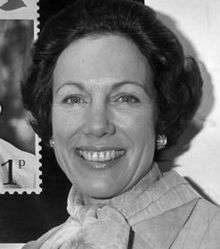Anne Armstrong
- For the American novelist, see Anne W. Armstrong.
| Anne Armstrong | |
|---|---|
 | |
| United States Ambassador to the United Kingdom | |
|
In office March 17, 1976 – March 3, 1977 | |
| President |
Gerald Ford Jimmy Carter |
| Preceded by | Elliot Richardson |
| Succeeded by | Kingman Brewster |
| Counselor to the President | |
|
In office January 19, 1973 – December 18, 1974 | |
| President |
Richard Nixon Gerald Ford |
| Preceded by | Robert Finch |
| Succeeded by | Patricia Lindh (Special Assistant for Women) |
| Personal details | |
| Born |
December 27, 1927 New Orleans, Louisiana, U.S. |
| Died |
July 30, 2008 (aged 80) Houston, Texas, U.S. |
| Political party | Republican |
| Spouse(s) | Tobin Armstrong |
| Children | Katharine |
| Alma mater | Vassar College |
Anne Legendre Armstrong (December 27, 1927 – July 30, 2008) was a United States diplomat and politician, and the first female Counselor to the President; she served in that capacity under both the Ford and Nixon administrations. She was also the recipient of the Presidential Medal of Freedom.
Biography
She was born in New Orleans, Louisiana, and graduated from Vassar College in 1949. In 1950, she married Tobin Armstrong and moved to Kenedy County, Texas. From 1966 to 1968, she was the vice chairman of the Texas Republican Party. From 1971 to 1973 she was Co-chairman of the Republican National Committee, and she was the keynote speaker at the 1972 Republican National Convention. (She was the first woman from either major party to keynote at a national convention). Nixon named her as Counselor to the President on 19 December 1972, which she held from January 19, 1973 to November 1974 under President Ford.[1] In 1973, a young Karl Rove, then on his way to becoming the chairman of the College Republicans, suggested in a memorandum to Armstrong that the Republican Party show nonpolitical films (such as John Wayne movies and Reefer Madness) at College Republican clubs as part of a strategy to raise support for the party among students and for fundraising.
From 1976 to 1977, Armstrong was the first woman United States Ambassador to the United Kingdom. At the 1976 Republican National Convention in Kansas City, Missouri, there was a draft effort to put Armstrong on the ticket as the vice presidential nominee with incumbent President Gerald Ford; Senator Robert Dole of Kansas was instead chosen by Ford. In 1978, Armstrong supported George W. Bush in his successful primary challenge to Jim Reese in their congressional runoff primary in Texas's 19th congressional district.[2] Bush, however, lost the general election that fall to then Democrat Kent Hance.
In 1987, Armstrong was given the Presidential Medal of Freedom by Ronald Reagan. She received an honorary Doctor of Laws from St. Mary's University in 1978.
In addition to her public life, Armstrong served on the boards of many U.S. corporations, including American Express, Boise Cascade, Halliburton, and General Motors. She also served on the board of non profit organizations such as Center for Strategic and International Studies and was a member of the Founding Council of the Rothermere American Institute, and the University of Oxford.
Armstrong died of cancer at a hospice in Houston.
Her daughter, Katharine Armstrong, is a Bush Pioneer and was at the Armstrong family ranch south of Corpus Christi when the Dick Cheney hunting incident occurred there in February 2006.[3]
References
- ↑ Nixon Names Mother of 5 As Counselor
- ↑ "Mayor Jim Reese of Odessa and the Republican Party in the Permian Basin", The West Texas Historical Association Year Book, Vol. LXXXVII (October 2011), p. 138
- ↑ "Cheney's hunting host lobbied White House". NBC Investigative Unit via MSNBC. 2006-02-15.
External links
- Brief biography from the Gerald R. Ford Library
- Brief biography on Seven Revolutions site
- A Few Good Women... The Honorable Anne Legendre Armstrong
| Political offices | ||
|---|---|---|
| Preceded by Robert Finch |
Counselor to the President 1973–1974 |
Succeeded by Patricia Lindh as Special Assistant to the President for Women |
| Party political offices | ||
| Preceded by Daniel Evans |
Keynote Speaker of the Democratic National Convention 1972 |
Succeeded by Howard Baker |
| Diplomatic posts | ||
| Preceded by Elliot Richardson |
United States Ambassador to the United Kingdom 1976–1977 |
Succeeded by Kingman Brewster |
| ||||||||||||||||||||||||||||||||||||||||||||||||||||||||||||||||||||||||||
|